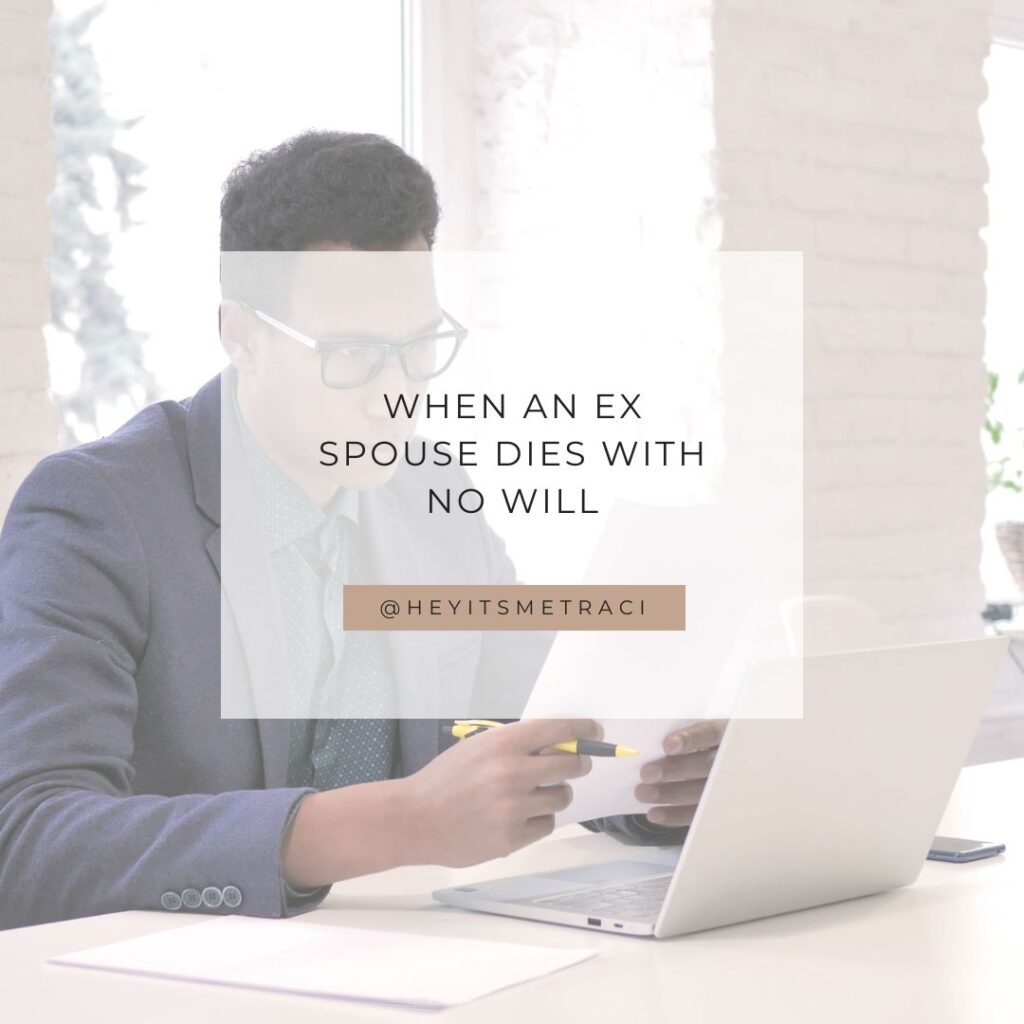When my ex spouse died with no will, I found the process of distributing their assets and property can become complicated. A will is a legal document that outlines how a person’s assets and property should be distributed after their death. Without a will, the distribution of assets and property is determined by state laws, which can vary depending on the state in which the deceased person lived.

Assets and Property Division
One of the main issues that arises when an ex spouse dies with no will is determining who is entitled to their assets and property. In most states, if an ex-spouse dies without a will, their assets and property will pass to their next of kin, which includes their children, parents, and siblings. However, if the deceased ex-spouse has no living relatives, their assets and property will become the property of the state.
Executor of the State
Another issue that can arise when an ex spouse dies with no will is determining who will be the executor of the estate. The executor is the person responsible for managing the deceased person’s assets and property and distributing them according to state laws. Without a will, the court will appoint an executor, which can be a family member or a legal professional.
Contacting an Attorney
If you are an ex-spouse of the deceased and are entitled to a portion of their assets and property, it is important to contact an attorney as soon as possible. An attorney can help you understand your rights and guide you through the process of claiming your share of the assets and property.
Outstanding Debts
It is also important to note that if the deceased ex-spouse had any outstanding debts, those debts will need to be paid before any assets and property can be distributed. This means that if the deceased ex-spouse had a mortgage, credit card debts, or other outstanding loans, those debts will need to be paid before any assets and property can be distributed to the beneficiaries.
Disputes
If there is a dispute over the distribution of assets and property, the court may need to intervene to resolve the matter. This can be a time-consuming and costly process, and it is important to have an attorney to represent your interests.
When an ex dies without a will, the process of distributing their assets and property can be complex and time-consuming. It is important to understand your rights and seek the advice of an attorney to ensure that your interests are protected.
Children
It is also important to be aware that if the deceased ex-spouse had any children, they will be entitled to a portion of the estate, regardless of the state of the relationship with their parent. Children are legal heirs and entitled to inheritance. In my case, this was something that my ex husband had never done. The kids were left with nothing. So it was up to me to try to provide for them through social security survivor benefits.
Joint Accounts
In addition, if the deceased ex spouse had any joint accounts, or any assets that were in both of your names, these assets will pass to the surviving owner upon death. It is important to seek legal advice if you have any questions about the distribution of these assets.
Benefits
In summary, when an ex spouse dies with no will, the distribution of their assets and property can become complicated. The assets and property will be distributed according to state laws, which can vary depending on the state in which the deceased person lived. It is important to understand your rights and seek the advice of an attorney to ensure that your interests are protected. It is also important to be aware that if the deceased ex-spouse had any children, they will be entitled to a portion of the estate, regardless of the state of the relationship with their parent. It’s also important to note that if the deceased ex-spouse had any outstanding debts, those debts will need to be paid before any assets and property can be distributed.
More Information
- Navigating Social Security Survivor Benefits When an Ex Spouse Dies
- Coping With the Death of an Ex Spouse or Partner

This article is for informational purposes only. Please consult with a trusted advisor.
Leave a Reply